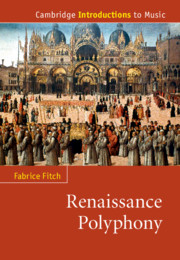Book contents
- Cambridge Introductions to Music
- Cambridge Introductions to Music Renaissance Polyphony
- Copyright page
- Dedication
- Contents
- Illustrations
- Figures
- Tables
- Music examples
- Acknowledgements
- Note on the music examples
- Note on the bibliography
- Abbreviations
- Chapter 1 Introducing Renaissance polyphony
- Chapter 2 Making polyphony: sources and practice
- Chapter 3 Makers of polyphony
- Chapter 4 Pitch: an overview
- Chapter 5 Voice-names, ranges, and functions
- Chapter 6 Mensural notation, duration, and metre
- Chapter 7 Genre, texts, forms
- Chapter 8 ‘Cantus magnus’: music for the Mass
- Chapter 9 ‘Cantus mediocris’: the motet
- Chapter 10 ‘Cantus parvus’: secular music
- Chapter 11 Scoring, texture, scale
- Chapter 12 Understanding musical borrowing
- Chapter 13 Canons, puzzles, games
- Chapter 14 Performance practice: a brief introduction
- Notes
- Glossary
- Bibliography
- Index of compositions
- General index
- Cambridge Introductions to Music
Chapter 13 - Canons, puzzles, games
Published online by Cambridge University Press: 13 August 2020
- Cambridge Introductions to Music
- Cambridge Introductions to Music Renaissance Polyphony
- Copyright page
- Dedication
- Contents
- Illustrations
- Figures
- Tables
- Music examples
- Acknowledgements
- Note on the music examples
- Note on the bibliography
- Abbreviations
- Chapter 1 Introducing Renaissance polyphony
- Chapter 2 Making polyphony: sources and practice
- Chapter 3 Makers of polyphony
- Chapter 4 Pitch: an overview
- Chapter 5 Voice-names, ranges, and functions
- Chapter 6 Mensural notation, duration, and metre
- Chapter 7 Genre, texts, forms
- Chapter 8 ‘Cantus magnus’: music for the Mass
- Chapter 9 ‘Cantus mediocris’: the motet
- Chapter 10 ‘Cantus parvus’: secular music
- Chapter 11 Scoring, texture, scale
- Chapter 12 Understanding musical borrowing
- Chapter 13 Canons, puzzles, games
- Chapter 14 Performance practice: a brief introduction
- Notes
- Glossary
- Bibliography
- Index of compositions
- General index
- Cambridge Introductions to Music
Summary
Extending several of the themes explored previously (especially in Chapters 3 and 12), this chapter explores the notion of game-playing (in the widest sense) and its incidence on the conception and reception of Renaissance polyphony. Topics include: hexachord pieces and games involving specifically musical device (e.g. ostinato); pitch-related games, especially cadence; fugal and non-fugal canons; Augenmusik and visual puzzles or paradoxes; and the relationship between music and number. The question to whom these games were directed, and to what end, surfaces once again. It is proposed that much in Renaissance polyphony that was regarded by critics of later periods as self-indulgently abstract or abstruse is attributable to this ludic quality, which was ‘lost in translation’, particularly by writers of the Enlightenment and its aftermath. Yet again, listeners are encouraged to consider what lies beyond the sound-image of Renaissance music, thus deepening their appreciation of the music.
- Type
- Chapter
- Information
- Renaissance Polyphony , pp. 197 - 222Publisher: Cambridge University PressPrint publication year: 2020



